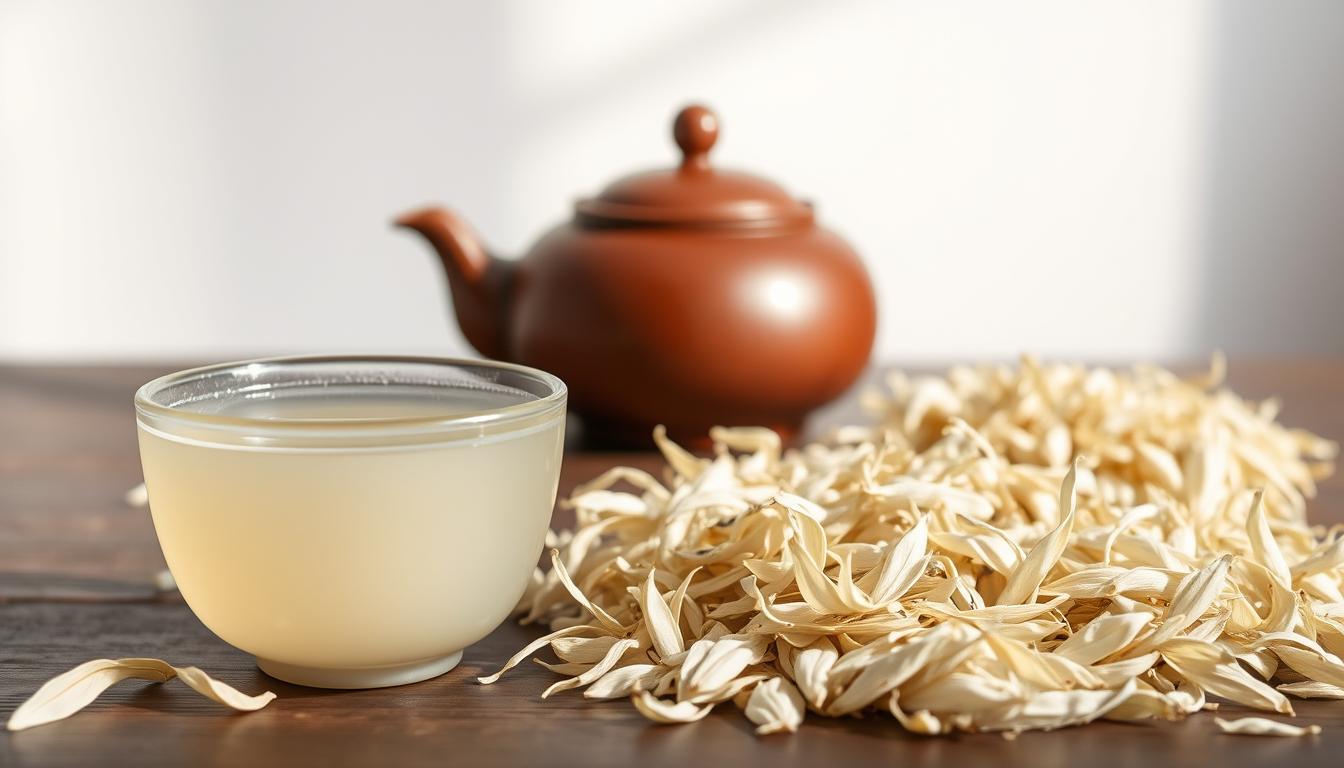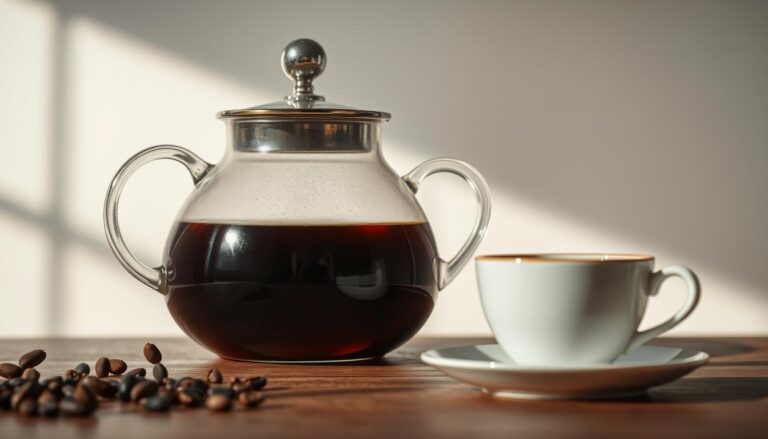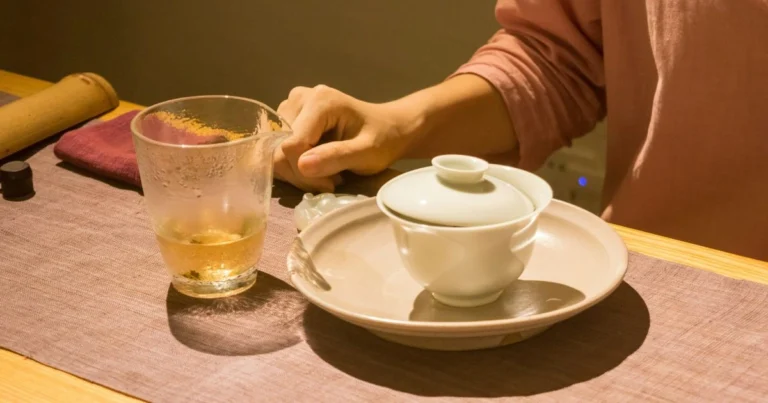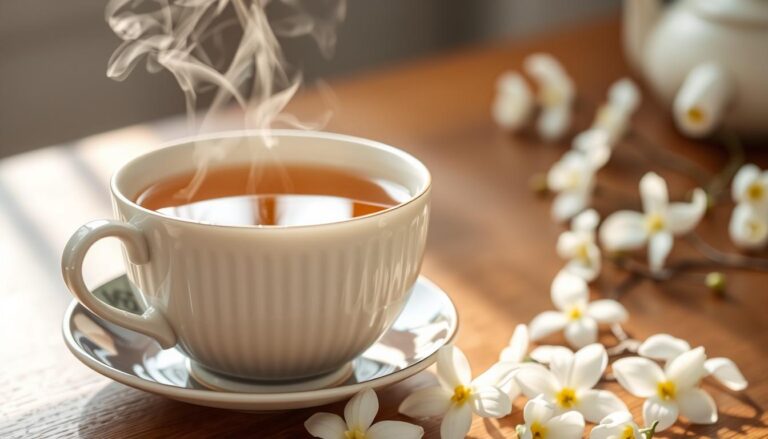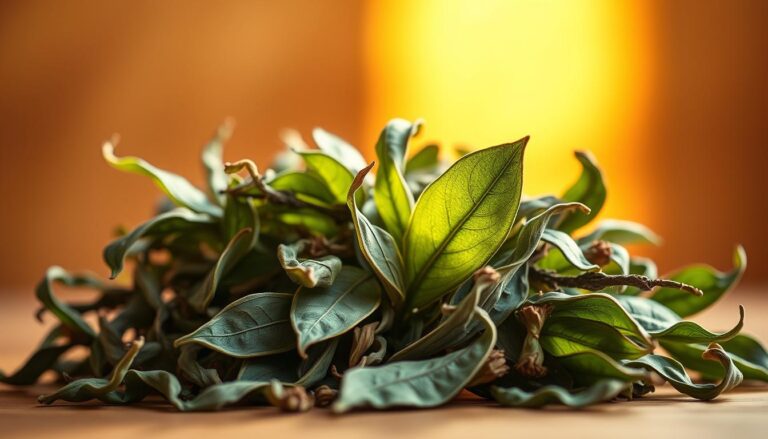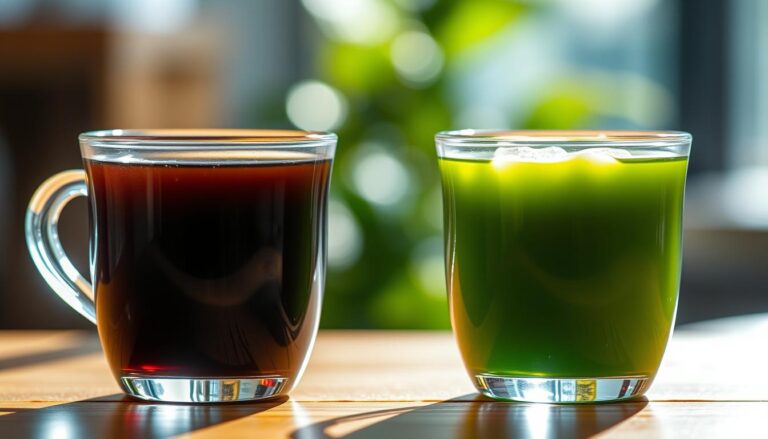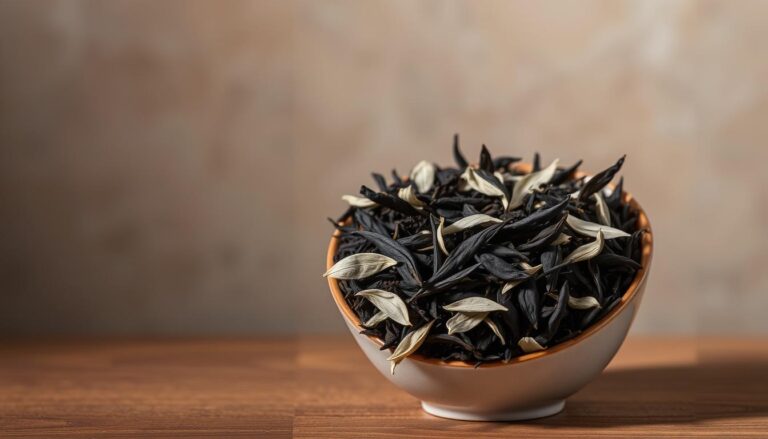White Tea Caffeine: 5 Key Fact You Need to Know
My first sip of white peony tea was a game-changer. I was looking for a white tea caffeine boost that was gentle. It energized me without the jitters I got from coffee.
Are you curious about white tea caffeine? You’re in the right spot. White tea gives you energy in a special way, unlike other teas. It’s perfect if you’re watching your health, sensitive to caffeine, or just want to try something new.
White tea is more than just a caffeine fix. white tea caffeine is a complex drink that can improve your health. Let’s explore the key facts that will help you choose white tea wisely.
Key Takeaways
- White tea caffeine less compared to green and black teas
- Harvesting time and processing significantly impact caffeine levels
- White peony tea offers unique health benefits beyond caffeine
- Brewing methods can influence the final white tea caffeine content
- Individual sensitivity to caffeine varies widely
What Is White Tea and How Is It Made?
White tea is a delicate and refined drink with a long history in ancient China. It’s made from the Camellia sinensis plant. This tea is special because it’s processed very little and tastes amazing. Let’s explore where white tea comes from and how it’s made.
White tea’s story starts in China’s imperial courts, where it was a rare and precious drink. It’s called white tea because of the fine white hairs on the young tea buds. These hairs make the tea look unique.
Origins of White Tea
White tea comes from Fujian province in China, especially from Zheng He County. The top varieties are:
- Bai Mu Dan (White Peony)
- Silver Needle
- White Peach Blossom
Harvesting and Processing Techniques
White tea’s magic comes from how it’s harvested and processed. It’s picked when the tea buds are very young.
| Harvesting Stage | Characteristics | Processing Method |
|---|---|---|
| Early Spring Harvest | Young buds with silver-white downy hair | Minimal withering and quick drying |
| Hand Selection | Only highest quality buds picked | Natural air or low-temperature drying |
| Limited Processing | Minimal oxidation | Preserves natural antioxidants |
“White tea is poetry in a cup, a testament to nature’s delicate beauty.” – Tea Master Li Wei
Bai mu dan tea is another beautiful variety. It uses slightly older leaves with the young buds. This makes the tea taste more complex but still light.
Understanding White Tea Caffeine Content
White tea caffeine is a unique profile. It’s different from other teas. When you try white peony flower tea, you’ll find a light drink with caffeine levels that might surprise you.
The amount of caffeine in white tea depends on a few things. Pai mu tan tea, a well-known white tea, has less caffeine than black and green teas. This makes it great for those who want a gentle caffeine boost.
Comparing Tea Caffeine Levels
Here’s a look at caffeine in different teas:
- White Tea caffeine: 32-37 mg per 8 fl oz
- Green Tea : 24-39 mg per 8 fl oz
- Black Tea: 64-112 mg per 8 fl oz
Factors Influencing Caffeine Levels
Several things can change the white tea caffeine in your cup :
- Harvest time: Younger tea buds have more caffeine
- Brewing duration
- Water temperature
- Leaf-to-water ratio
Knowing these factors lets you control the caffeine in your white peony flower tea. White tea’s minimal processing means it has less caffeine than teas that are more oxidized.
Health Benefits of White Tea
White peony loose leaf tea is more than a tasty drink. It’s packed with health benefits that boost your well-being. Its special mix offers strong wellness perks that help keep you healthy and full of energy.
Adding white peony loose leaf tea to your wellness plan is a smart move. Its natural goodness brings many health benefits:
- Rich in polyphenols that fight off cell damage
- Boosts your immune system
- May help speed up your metabolism
- Has low caffeine for a gentle energy boost
Antioxidant Properties
White tea is full of antioxidants, more than any other tea. These strong fighters protect your body from harmful free radicals. They help prevent chronic diseases and slow down aging.
Potential Impact on Weight Loss
Studies show white peony loose leaf tea might aid in weight loss. Its metabolism-boosting effects can help you reach your fitness goals. Just remember to eat well and exercise regularly too.
White tea’s delicate flavor masks its powerful health-promoting potential.
Choosing white tea for your daily drink means you’re picking a beverage that’s not only delicious. It also supports your health and wellness goals.
How White Tea Caffeine Affects You
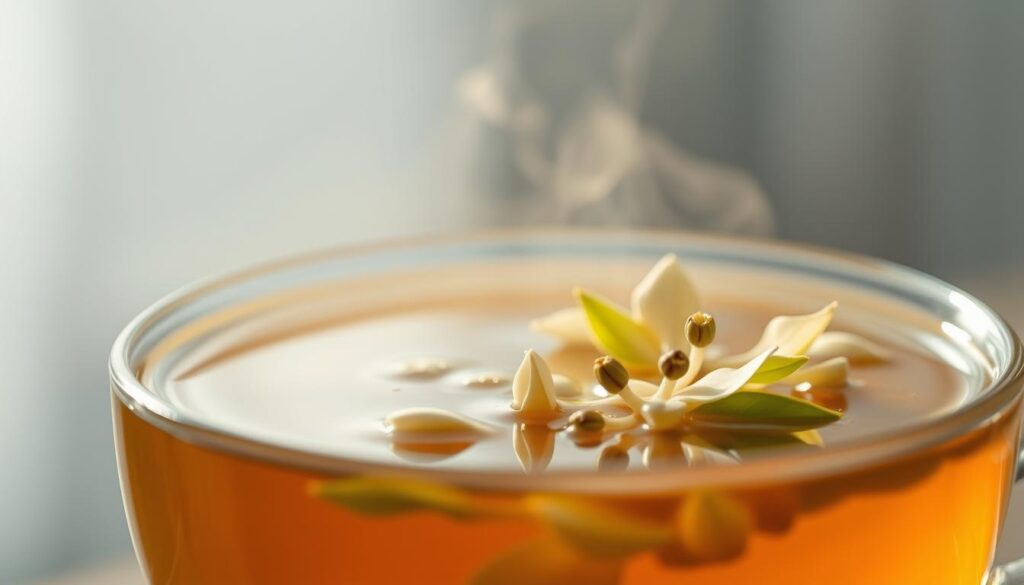

White peony herbal tea is special because of how it handles caffeine. It combines caffeine with L-theanine for a unique effect on your body and mind.
Knowing how white tea affects you can guide your drink choices. The caffeine in white peony herbal tea acts differently than in other caffeinated drinks.
Short-Term Physical Responses
Drinking white tea triggers several quick reactions:
- Gentle energy boost without jitters
- Enhanced mental clarity
- Improved concentration
- Mild metabolic stimulation
Long-Term Physiological Considerations
Drinking white peony herbal tea regularly may offer subtle yet important benefits:
- Potential cognitive function support
- Metabolic rate optimization
- Reduced oxidative stress
- Gradual adaptation of caffeine sensitivity
The mix of white tea caffeine and L-theanine in white tea gives a balanced energy experience. It’s different from coffee’s quick rise and fall.
White tea caffeine offers a refined way to enjoy , perfect for those who care about wellness and want a better choice than traditional energy drinks.
Brewing White Tea for Optimal Enjoyment
Learning to brew the best white peony tea is an art. It’s about finding the right way to make it. This can turn a simple cup into a special experience, bringing out the tea’s delicate flavors.
Recommended Temperature and Steeping Precision
White tea needs gentle care to keep its delicate taste. The best brewing temperature is between 160-170°F. This helps get the tea’s finest flavors without bitterness. Steeping times vary:
- Loose leaf best white peony tea: 1-3 minutes
- Bagged white tea: 2-4 minutes
- Cold brew method: 6-8 hours in refrigerator
Expert Tasting and Savoring Techniques
To enjoy white tea fully, use all your senses. First, look at the tea’s color. Then, smell its aroma. Finally, sip it slowly. The best white peony tea tastes light, sweet, and floral.
| Brewing Factor | Recommended Approach |
|---|---|
| Water Quality | Filtered or spring water |
| Tea Quantity | 1-2 teaspoons per 8 oz water |
| Recommended Vessel | Porcelain or glass teapot |
Every time you brew, you can get better at it. This helps you love this elegant tea even more.
Daily Caffeine Limits: What You Should Know
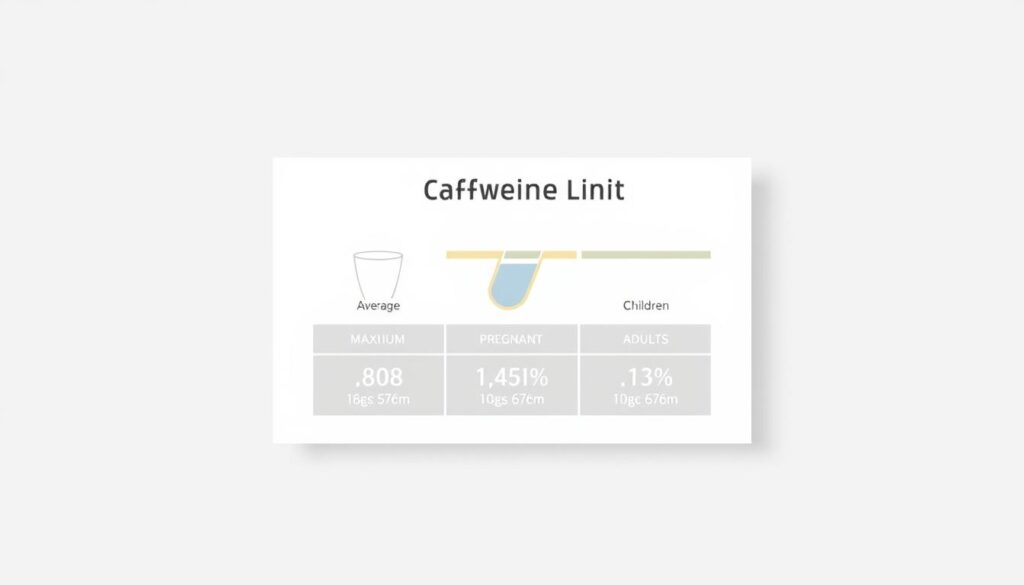

It’s important to know how much caffeine you take in each day. White tea has a certain amount of caffeine that can affect your total intake. The FDA has guidelines to help you stay safe and healthy.
When you drink white peony tea, think about your health and lifestyle. It’s all about finding the right balance.
Recommendations from Health Experts
Health experts give advice on how much caffeine is okay:
- The FDA says healthy adults should not have more than 400 milligrams of caffeine a day
- One cup of white tea has about 15-30 milligrams of caffeine
- How much caffeine you can handle depends on your body and how sensitive you are
Personalizing Your Intake
Your caffeine from white tea should match your personal needs. Think about these things:
- Your age and health
- If you have any health issues
- How your medicines might react with caffeine
- How well you sleep
- How stressed you are
Moderation is key when enjoying white peony tea and managing caffeine intake.
Pay attention to how your body reacts to white tea. If you feel jittery, can’t sleep, or feel anxious, you might need to drink less.
Common Misconceptions About White Tea Caffeine
Understanding white tea can be tricky, especially when it comes to caffeine content. Many people have misconceptions about white bud tea that prevent them from fully appreciating this delicate beverage.
Let’s clear up some of the most persistent myths about white tea and its caffeine levels.
Separating Myths from Reality
- Myth: White tea is completely caffeine-freeReality: White peony flower tea actually contains caffeine, though typically less than black or green tea. The caffeine content varies depending on the specific type and brewing method.
- Myth: All white teas have the same caffeine levelReality: Caffeine content can differ significantly between various white tea varieties. Factors like harvest time, processing, and leaf selection play crucial roles in determining caffeine levels.
- Myth: White tea will keep you awake all nightReality: While white tea does contain caffeine, its lower concentration means it’s less likely to cause significant sleep disruptions compared to other caffeinated beverages.
Understanding the Truth
Many tea enthusiasts mistakenly believe that white bud tea is a caffeine-free alternative. In reality, it offers a gentle caffeine boost that can be perfect for those seeking a milder stimulant compared to coffee or energy drinks.
The key is understanding that moderation and personal sensitivity are crucial when enjoying white tea.
Your individual response to caffeine will vary, so it’s essential to pay attention to how your body reacts to white peony flower tea and adjust your consumption accordingly.
White Tea in Popular Culture
White tea has become a big deal in the US, especially among those who care about their health. Bai mu dan tea and pai mu tan tea are more than drinks. They symbolize a choice for a natural, holistic way of living.
The wellness world loves white tea for its special qualities and health perks. Influencers and health pros point out several reasons for its fame:
- It’s minimally processed, keeping nutrients intact
- It has less caffeine than other teas
- It’s packed with antioxidants
- It has a light, smooth taste
Trending Among Wellness Enthusiasts
Wellness fans have made white tea a big hit. Bai mu dan tea is especially loved for its gentle taste and health benefits. Fitness gurus, nutritionists, and bloggers often suggest it for a healthy lifestyle.
Celebrity Endorsements
Wellness stars have picked pai mu tan tea as their go-to drink. Celebrities and athletes have made it famous in health and lifestyle scenes. Their support has turned white tea into a sign of mindful living.
“White tea isn’t just a drink – it’s a moment of zen in a cup.” – Wellness Influencer
As the wellness trend keeps growing, white tea stays at the top. It offers a great mix of taste, health, and style.
Conclusion: Enjoying White Tea Mindfully
White tea is a journey into subtle flavors and gentle wellness. As you explore white peony loose leaf tea, you’ll find a drink that’s both tasty and healthy. It’s a mindful experience when you know its delicate nature.
Choosing the best white peony tea means looking at quality and how to brew it. Each cup connects you to a long tradition and supports your health. Your way of drinking white tea should match your lifestyle and caffeine needs, making it a personal ritual.
Try different brewing methods and times to find your favorite white tea moment. Whether it’s a morning pick-me-up or an afternoon calm, white tea fits your needs. Remember, enjoy it in moderation to get the most benefits without feeling overwhelmed.
Your white tea journey is special. By knowing its caffeine, enjoying its flavor, and listening to your body, you’ll bond with this unique drink. See white tea drinking as a mindful practice that enriches your body and spirit.

